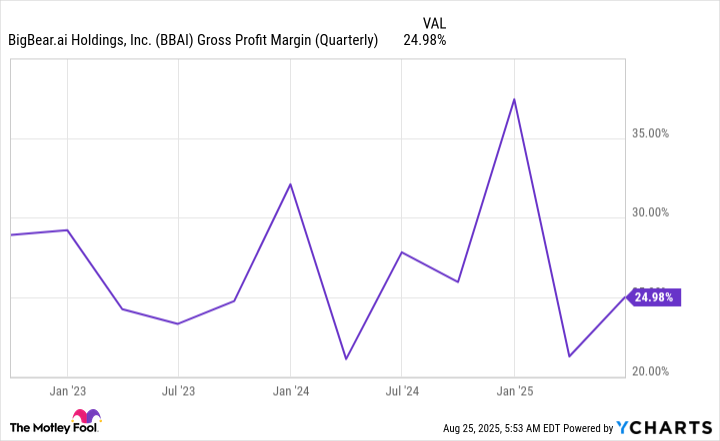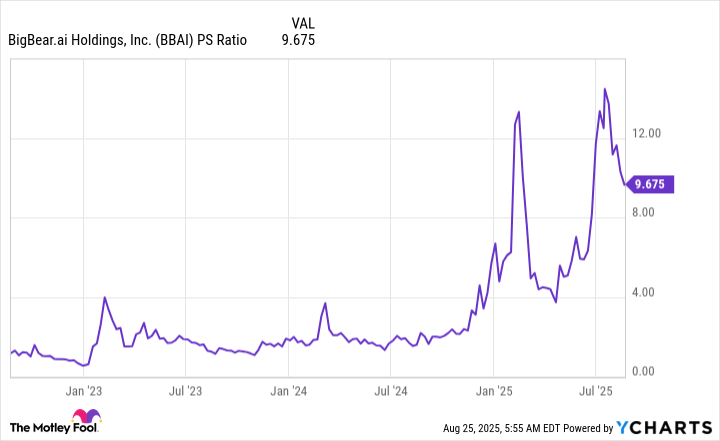Finding stocks with massive upside is the goal of nearly every investor. However, identifying stocks that can turn $10,000 into $1 million is no easy task. Very few stocks have achieved this feat, but the ones that have start off as relatively small companies and operate in a massive and growing market.
BigBear.ai (BBAI 3.65%) fits that criteria, as it's only a $2 billion company and operates in the massive (and growing) artificial intelligence (AI) space. It's a popular pick among investors to produce explosive returns over the next few years, but can it achieve the 100-fold returns required to transform $10,000 into $1 million?

Image source: Getty Images.
BigBear.ai offers custom AI software for its clients
BigBear.ai provides tailored AI solutions to a few entities, but is really focused on the government. Its biggest contract is a five-year deal valued at $165 million to provide the U.S. Army with a Global Force Information Management system. Essentially, it allows the Army to use data to ensure it has the proper training, equipment, and resources for whatever mission is at hand. This isn't an off-the-shelf product BigBear.ai is building; it's a fully custom solution.

NYSE: BBAI
Key Data Points
Another area where BigBear.ai is seeing demand is in airport security. Its products are deployed at several major airports and use biometrics and AI to streamline arrivals while preventing unauthorized entry through customs. This is a different software that's being used by the Army, and showcases one of the key investing points for BigBear.ai.
BigBear.ai provides custom AI solutions to its clients, which is great for them. However, it's not as great from an investing standpoint because new software must be developed for each contract it wins. As a result, BigBear.ai's margins aren't as healthy as some may expect for a software company. While most software companies are producing gross margins in the 70% to 90% range, BigBear.ai's are noticeably lower.
BBAI Gross Profit Margin (Quarterly) data by YCharts
As a result, investors shouldn't compare BigBear.ai's valuation to other software companies, as it doesn't have the same profit margin potential as its peers. With most software companies, the end goal is to achieve a net profit margin in the 30% range. Because the gross profit margin for BigBear.ai is less than that, it cannot achieve those levels.
Despite that, BigBear.ai trades at a fairly normal valuation for a software company.
BBAI PS Ratio data by YCharts
At slightly less than 10 times sales, BigBear.ai would be seen as a normal to cheap software stock if it produced regular gross margins. However, because it produces significantly lower margins, this price tag is incredibly expensive.
So, with BigBear.ai's poor margin profile and expensive stock price, it has two strikes going against it. But if it's growing at a rapid pace, these facts can be ignored. The problem is, BigBear.ai isn't growing at all.
BigBear.ai isn't growing despite a positive backdrop
While the U.S. Army contract is BigBear.ai's largest, it's having some issues. This caused BigBear.ai to reduce guidance for the year and also influenced its poor Q2 results.
Its revenue decreased by 18% in Q2 to $32.5 million, which is a huge red flag for a small company that investors are hoping can be the next big growth stock. Furthermore, the AI backdrop isn't going to get much better than it is right now, so if BigBear.ai isn't differentiating itself now, odds are it won't be able to in the future.
As a result, I think investors should look elsewhere if they're looking for a home run AI play. BigBear.ai has poor margins, an expensive price tag, and isn't actually growing. It's three strikes for BigBear.ai, and there are plenty of stocks available that have great margins, low valuations, and are rapidly growing.







